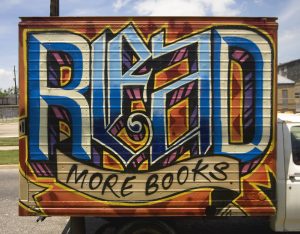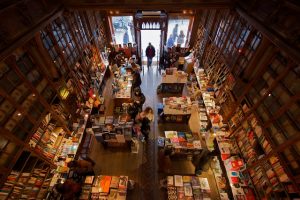Posts by Sarah McCoy
When writing a new novel, the idea usually finds its way to me through a historical tidbit or unexplored emotion that sticks like a pin in my psyche. If I find myself searching the internet on the topic instead of doing whatever is clearly on my To Do list, then I know… maybe this could be something.
I’m sure many of you have found yourself in a similar situation. We creative types love the first sip of fresh story water. It’s what keeps us coming back to the well! But it’s the effort of cranking down the bucket in the seemingly bottomless dark that can leave me frustrated. I often pull up my rope, drop my chin to my chest, and proclaim: “It’s dry, the well is dry! I’m never going to drink again. I’m going to die of thirst. It’s over.”
(Note: This may only be my overwrought response.)
When really, what I need to do is wait a beat. Let the rains come. Let deep waters stir. Allow the well to fill up organically. This was the case when I started writing my forthcoming novel Mustique Island. I had just published Marilla of Green Gables and my agent and editor asked, “What’s next?”
There is nothing more terrifying than that question when you don’t have an answer. It doesn’t matter what career you’re in. Writers to surgeons to tumblers in a circus, it’s the same. “I don’t know” is a terrifying declaration. But I honestly didn’t. As my husband will attest, when the ability to BS (blow smoke—of course!) was handed out on the soul manufacturing line, I did not receive. I show all my cards. I don’t know how to be any other way. So, I couldn’t even fake-it-till-you-make-it.
Instead of going to the well and cranking down, down, down, willing the bucket to smack story waters, I took a breather. I stepped away from my desk and gave myself permission to be a student explorer of history again.
It was while watching a PBS documentary on Princess Margaret that I first discovered the Caribbean island of Mustique. Princess Margaret’s Lady-in-waiting Anne Tennant and her husband Colin gave a piece of the island to the new Count and Countess of Snowdon as a wedding gift. Later, during her unhappy marriage, it became a sanctuary for the Princess to “do as she pleased.”
Cue the psychic pin: I had never heard of Mustique Island, and I grew up in the Caribbean. My mom is Puerto Rican and most of my extended familia continue to live on the island. I felt a sudden sense of not-knowing curiosity and yes, maybe even slight defensiveness. This was a secret island full of secrets in a place I called home.
It’s like that moment when you realize that your mother who has always been ‘mom’ had a life before you re-named and claimed her ‘mom.’ You’re re-meeting a person/place that you already have an innate kinship with. It was a strange and catalyzing experience. I couldn’t focus on anything else but gleaning everything I could about Mustique Island and what exactly “do as one pleased” entailed.
The well was filling up.
Here are some areas to delve into if you’re standing beside your writing well, feeling empty and unknowing.
Read More
We are entering the season of traditions in a time when nothing is traditional.
It feels especially strange when the rest of creation appears to be operating routinely. The sun and moon continue to orbit like clockwork: the days growing shorter, the nights longer. The trees are all turning shades of amber and scarlet. The woodland critters collect their winter provisions as temperatures dip, dip, dip on the same scientific bell curve followed since the dawn of time.
The natural world is paying no mind to the fact that kids aren’t back in their conventional school desks, families aren’t sitting round their tables, football stadiums aren’t roaring with fanfare, and the traditional social calendar has been completely thrown out.
A devotee of musicals, I can’t help but hear Tevye from Fiddler on the Roof raising fists to the sky, “Tradition, tradition!”
But, really, what are traditions? The dictionary says that they are customs or beliefs passed on from one person to the next, from one time to the next. A tradition can last for a season: We get Big Dipper cones from the ice cream truck in the summers. Or for generations: My family goes to church every Christmas Eve. But the fuzzy edges of traditions remind us that they had a starting point, which means they will, eventually, have an ending. Maybe not permanently—that’s another nebulous area. A tradition can stop and then pick up again at another juncture in history. Breaks don’t mean termination. They simply illustrate that we are human and so, nothing about us is certain. Everything living— from our bodies to our communities— is in a constant state of reinvention. It’s what defines us from the rest of the universe. It’s what makes us unique.
So then, why are we surprised when our self-imposed conventional algorithms disappoint?
It’s made me 1) think about how I define a tradition, and 2) evaluate if the traditions I maintain are helping or hindering my access to peace, joy, and love.
Because sometimes a tradition becomes a burden. It mutates from being a thing we long to do to a thing we feel we must do out of obligation. Cherished tradition and ritualistic superstition can mesh so that we can’t tell one from the other. Recognizing the difference is the linchpin.
Read MoreWe are officially in the Dog Days of Summer, and I would venture to say that this might go down in history as the doggone doggiest summer of humankind. For once, that’s no exaggeration. And while you may be reading this nodding, crying, shaking your head, or catatonic with disbelief that we are still in a coronavirus pandemic, I must warn you that I do not use the term ‘dog’ in a negative context. Quite the opposite. I am here to honor the sometimes vexing (excessive barking at mailperson), often distracted (squirrels, birds, butterflies, dandelion tufts in the breeze), but always devoted (furry cuddles for hours) humble hound.
How fitting for the Greeks to call the brightest star Sirius— the Dog Star. Its annual path across the night sky in pursuit of Orion is so named the Dog Days of Summer. There’s something eternally uplifting about this ancient history in light of our volatile modern one. The promise that a bright, faithful friend will follow us is a comfort.
If this is the first time we’ve met here, you should know that I have such a friend. His name is Gilbert, a.k.a. Gilly. He’s nine pounds of inexhaustible love and ferocious fluff. Many of you have your own dog star beside you at this very minute. Little bodies with colossal souls. I know for a fact that I could not have journeyed through 2020 without him following at my heels.
Immune to COVID, Gilly daily reminds me that we, humans, are not the masters of the universe that we often think ourselves. Our meticulously devised civilization is entirely undone by the invisible—a virus. It reminds me of that scene in Disney’s The Sword in the Stone when Madam Mim contracts measles during the Wizards’ Duel. I can’t even leave the house without a mask, hand sanitizer, and a six-foot bubble. Meanwhile, my dog is licking dirty shoes and bringing home dead bugs without so much as a sniffle. In fact, I haven’t seen Gilly happier. Suddenly, his family is going for long walks, playing in the garden for hours, snuggling on the couch at night, baking treats, and grilling on the back porch. It’s positively his Shangri-La.
Read MoreJune 2019
One year ago today, I was in London with my husband riding the Underground transit from Piccadilly Circus to High Street, Paddington to Westminster, packed nose to nose in a metal tube launching us at warp speed across the city. Up and down the lifts, rushing through the turnstiles, bumping our way through the opening train doors in an ocean of commuters. We saw nothing extraordinary about it at the time. Public subways in big cities are so common that we even grumbled at the chore of it.
At one stop—Notting Hill Gate, I believe, because I remember thinking, This cluster wasn’t in the romcom film! It was so crowded that we almost got left behind. We had just made it inside the passenger car when the doors slid closed and caught on my jacket. They reopened to the silent frowns of my fellow commuters.
Overhead a cheery female auto-voice said, “Mind the gap.”
The doors tried to close again and despite holding my breath and leaning forward, I was still in the way.
“Mind the gap,” she repeated.
This time, the passengers audibly groaned. I was holding up the train. And let me tell you… there is nothing quite so politely shaming as the British groan.
The only way for me to fit was to bear hug my husband, bury my face in his chest, and hold on for dear life.
The gap
The gap is the six inches of void between the station platform and the subway car. The space that drops down to the electrified vacuum below. Being new to this mind the gap business, I probably analyzed it far more than I should. Six inches seemed too small to lose a foot, but a high-heeled shoe for sure. One could certainly twist an ankle. God forbid a small child reach a hand into the gap. A thin walking cane could fall clean through, and I was sure many had lost house keys, money, sunglasses, heirloom jewelry… but what else had been lost in that gap? Much, I presumed, if Parliament, the Queen, or whomever, had decided that warning was necessary.
Mind the gap. She said it every time the doors opened and closed. When you’re riding for half an hour or longer with stops every two minutes, you hear a lot of “Mind the gap. Mind the gap. Mind the gap.”
It became my husband and my Summer 2019 catchphrase:
We’d take our seats at a restaurant, and he’d scoot my chair closer, “Mind the gap.”
I’d be washing my face in our minuscule London apartment bathroom, and he’d saddle up beside me to spit out his toothpaste. “Come on, man,” I’d plead. “Mind the gap.”
He’d look left instead of right crossing the street, and I’d throw an arm out to stop him. “Mind the gap.”
I’d text my baby brother, forgetting the time difference between London and Miami. My husband would remind me, “Mind the gap.”
June 2020
Read MoreIt goes without saying that the time between my last post and now has been rollercoastic. That’s not a word. I made it up. But making things up feels appropriate given the global coronavirus shutdown. We are living a reality that seemed only to exist in science fiction. Stranger still was celebrating two milestone birthdays during this apocalyptic time.
Doc B and I were born exactly four weeks apart. I’m the perpetually younger. His birthday is in March and mine is in April.
With civilization under isolation sanctions, grocery stores shelves empty, gatherings prohibited, and blowing out candles over a cake a morbid risk, the simple pleasures suddenly seemed the greatest gifts. In hindsight, we realize that the things we once thought common, even pedestrian, are the richest parts of our collective humanity. Birthdays connect us to the natural world, those who are living, those who once lived, and those who will live one day.
A friend of mine gave birth in the middle of the coronavirus pandemic peak in New York City. I can’t imagine what that must’ve been like for her, her husband, her family, never mind the baby—a healthy boy! But what I do know is that across the miles and social media platforms, we all cheered, cried, raised hands to the heavens in celebration for this new addition to an altogether unpredictable planet. Sure, we celebrate all births, but this one felt special, and I believe it was because it reminded us that life will win. Even when a pandemic threatens the opposite, this one new soul in a new body in an old place reaffirms that despite all evidence to the contrary, life is happening and will continue to happen. It gave me a new resolve to treat each birthday (mine and others) with more honor than I have in the past.
When we think of childhood birthdays, they’re typically centered around frosted cakes, balloons, presents, and parties. Light and fun-filled, we only remember a handful from those early years, right? When we grow older, the socially expected response is to ho-hum and lament “another year, another wrinkle.” However, in light of this pandemic, I find both of the old ways trite. Birthdays deserve more inner reflection and respect. They are one of the purest of simple of pleasures.
We have no control over the time and date of our birth. We simply accept that life is a gift. So now I stop and read those words slowly to myself:
Life.
Is.
A.
Gift.
Read MoreWhile I am not scheduled to post a column this month, how could I not in light of a global pandemic? It is now when we are grasping for simple pleasures most of all.
At this very hour, my husband (Doc B) is at the hospital attending to patients. He’s been doing so 24/7 since the coronavirus hit our nation. As an immunocompromised individual, I am under strict lock-down. Self-isolation by way of a matrimonial physician. But I couldn’t just sit here at my desk while he’s out helping people. So, I’ve taken up my trade tool (words) and am attempting to bring some aid, comfort, or at the very least, a distraction to my fellow home bound community.
Here are six simple pleasures that have been Sarah-tested and approved. These require nothing and provide great relief from the toxic fear plaguing us as tenaciously as this microbial foe.
1) Flowers. Splurge on a bouquet at the store. Now is the time. There may not be toilet paper on the shelves but it’s the beginning of spring and Mother Nature is immune to Corona’s affliction. Doc B surprised me with a bunch of flowers, and I was stunned to tears at how effective they were in lifting my spirit. I filled vases and jelly jars, big and small, and put them in every room. If store-bought blooms are unavailable, don’t worry. Flowers are ubiquitous, which leads me to #2…
2) The outdoors. Just because we are under self-isolation doesn’t mean we are locked in jail. Isolate yourself in nature. Drive to a trail or pedestrian area if you must. Even cities with the highest populations have parks. Pick some wildflowers. Doesn’t matter how small. Snowdrops are early bloomers, so are daffodils, tulips, hyacinth, wild violets—heck, pull some clovers! Go on a scavenger hunt for these simple floral pleasures, and I dare you not to feel revived when you return with a palm full. If for whatever reason you cannot physically go outside, go for an online ‘walk’ through the garden shops and order flower seeds. Some of those sell for under $1.00. The anticipation of planting them on your windowsill is just as much a seed of hope.
3) A song. Load up your Spotify, play your favorite CD, tune into your local radio station, or sing your own. Doesn’t matter. A song is medicine of the angels, and it will resonate in you for hours… days… however long this quarantine takes. Doc B texted me a song this morning, and it bolstered my optimism. Hours later, when that optimism had been battered down, I stopped, closed my eyes, and sang the chorus out loud to myself. I have the voice of a warbling toad, mind you, but that’s the pleasure of a song. Its beauty exists in your heart’s ear no matter your musical limitations. When I opened my eyes, my dog Gilly had followed the melody to my feet. Lesson learned: when I reach for the simple pleasure, I inevitably find it doubled.
4) A dish. Cook something at home. It could be Julia Child’s coq a vin or a microwave bowl of popcorn. It really doesn’t matter what. The act of creating a nutritious, virus-free dish for yourself and your loved ones is […]
Read MoreDear friends,
Our wise editor Therese Walsh and I got to talking about recent joys, struggles, and all the things that go into the writing life. All the things that Writer Unboxed was founded upon. We decided that 2020 should be a new decade of simple pleasure jubilee.
Somewhere in the last few years, life got more complicated than ever before. Now, in addition to emails, we have Twitter, Instagram, Facebook, SnapChat, TikTok, and texts pinging at us day and night. I, for one, have a perennial headache from it all and wondered if anybody else in the cyber cyclone feels the same.
Instead of being defeated and throwing up my hands, I thought I’d toss a penny of hope into the torrent. Here begins my “Simple Pleasures” column.
Each post will highlight a simple pleasure to be shared. This is an opportunity to collectively celebrate ordinary moments that we might overlook in the frantic shuffle of our days. Life affirmations to bolstering each other through the months and remind us of why we seek to capture our experiences in writing. If nothing else, it will be a short, quick respite from the heaviness of our modern zeitgeist.
I pray you enjoy.
Yours truly,
Sarah
Sunset
I was standing on my farmhouse porch when sunset streaked the sky shades of honey-gold that I hadn’t known existed. I stood there, freezing my buns off, but unable to turn away until every glimmer turned to winter starlight.
Such majesty. Such wonder. And yet, few things on earth are more ordinary and accessible to the communal eye. Regardless of who you are, what is happening in the world, or where you stand in it, these moments of marvel are guaranteed. The sun rises and so, it must set. With human promises so easily broken, I take great hope in knowing that the heavens will remain true.
We don’t see a sunrise and worry all day, “Will it set? Gosh, I hope it sets. What if it doesn’t set—will we burn up, will the crops dry out, will everything fall to doom?”
No, because we have faith that while we cannot see or feel it, the earth is moving round the sun. As a matter of fact, the sun is neither rising nor setting. It’s fixed in the galaxy—the constant by which all our lives revolve. Our perspective is what’s changing from hour to hour.
Read MoreFlickr Creative Commons: Kevin O’Mara
I must confess: I stopped reading.
As a person whose vocation is writing books for people to read, I’m ashamed of this fact. I hid the truth from everyone, myself included, for nearly six months. I was busy, I said. Every time I picked up a book, I thought of something I needed to do: a writing deadline to meet, an Instagram post to craft, a friend’s book release to tweet, a presentation to prepare, an author event to attend, emails to reply, novels to blurb, a dog to walk, a husband to feed, a house to clean, a mother/father/brother/ friend to call, trash to take out, weeds to pull, a birthday card to write, a doctor’s appointment to make, leaves to sweep, an interview to give, a bag to pack, a trip to take, and it all required doing right that minute with no time to spare.
The calendar was my track and my train wheels kept moving faster and faster. I dared not complain because everybody’s wheels are moving fast—most even faster than my own. I bet you’re thinking to yourself this very second: if she only knew how fast I’m spinning. I give you full validation. No doubt, you’re spinning faster than I could ever imagine or hope to keep up.
Please hear my heart, none of the aforementioned To Do’s are negative. They’re all very important to my life. I wanted to do them. I gleaned great happiness in completing them—checking their boxes off my list. I may not have been reading as extensively as in the past (or at all), but I was being productive! I was taking care of business and keeping my train running smoothly.
It wouldn’t have dawned on me that I’d abandoned my love of reading if I hadn’t been sitting at a board meeting of a nonprofit I proudly support. Up for discussion was a vital piece of information in the fine print of one of our charitable pamphlets. To which, an esteemed fellow board member bemoaned, “Well, how is anybody supposed to see that? Nobody reads anymore.”
The remark stopped everyone but not for the reason you may think. We didn’t stop because what she’d said was false. We stopped to consider the truth of it, scrutinizing the text and sighing in agreement that perhaps a graphic was the better way to impart the detail.
It was a moment of stinging revelation for me: we are in an epidemic of immediacy. A culture of do-do-do, now-now-now, go-go-go. Everything is vying for our instant attention and demanding an instant answer. How in the world are the simple pleasures supposed to hold a candle? How is a slow-burning candle supposed to hold a candle? It can’t, not when a flick of a light switch will do the job in a fraction of a time with a thousand percent more power. And similarly, my personal reading pleasure has been afflicted and replaced by social media posts, book reviews, literary podcasts, and blogs. Like my To Do list, none of these are negative. Quite the opposite, they are hugely positive! It is a true joy meeting literary friends through these avenues. But I have to remind myself that […]
Read MoreFlickr Creative Commons: Judy Gallagher
This is my garden summer. If you follow me on Instagram, Facebook, or Twitter, you will quickly see that my posts have become progressively more vegetable and flower filled. In fact, that’s where I was just before sitting down to write this column: out in my garden, procrastinating with a hose and trowel under the auspice of these weeds can’t wait; then further distracted in my Google search on “How to get rid of June bugs on my roses?” (Answer: Neems oil!)
To most, it’s far from novel, in either of Webster’s definitions. But you must understand, this is my first garden. Yes, in all my life. So I pray you pardon my social media exclamations over squash blossoms, sprigs of basil, hydrangea plumes, and zinnias. Planting roots was never part of the gypsy life. Plus, for nearly a decade, we lived in El Paso where gardens were made of rocks and a handful of thorny desert rose bushes. When we moved, one of my biggest, ugly cries took place in my rose garden. It had brought me joy, comfort, and beauty when I needed it, and now I was leaving. It hurt—to have put so much time, energy, and love into something that I had to walk away from.
I had the added truth that every plant I had purchased or been gifted withered and died. I was grateful to friends who sent me constant replenishment. They knew me well—knew that I adore flowers. They are among my most favorite things on earth. But my black thumb was tried and true. For nearly four decades, I favored annuals. They came with a designated “going to die” stamp. Succulents were kind to me. They stayed around a little longer than the rest.
Then I moved to North Carolina. We built a farmhouse. We planted ourselves and wintered into our new home. This spring, we got our sod. Gorgeous stuff. I knew grass could thrive wild, but when it came to the gardens, I was terrified. Initially, I thought the safest route would be to put down river rock—everywhere. But then my mother reminded me of two things: 1) I come from green thumb people. My father’s kin were Oklahoma farmers and my mother is the daughter of a farming legacy in Puerto Rico. It was in my DNA… somewhere. 2) Planting a garden was not much different than writing a book. If I could do one, I could do the other, she said.
I argued against both. “DNA skips generations,” I told her, and a book and a garden were vastly different. For starters, a book was constructed in my temperature-controlled, weatherproofed writing office. A garden was open to Mother Nature’s whims. While I had no control over the former, I had a hand in the latter. I decided to give it a go. If only to say I had tried and look, more dead things.
I sat down with our landscaper and sketched out the basic property outline. Next, we moved to focal zones: the right side terrace, the backyard row, the left side circle; the front rose line, etc. I began to […]
Read MoreFlickr Creative Commons: Natalia Romay
In case you weren’t aware, April 27 is a national holiday: it’s Independent Bookstore Day. Only five years old, you might not have heard of it and that’s okay… because you have now! What could be more exciting than discovering we have a new holiday to bedazzle on our calendars?
In my humble opinion, we don’t have enough true holidays. I.e. Unadorned celebrations without the stress of gift giving, event planning, cooking complicated meals, decorating, and contending with the in-laws. Too often, holidays don’t feel like the definition of the word and more like its antithesis. So here I present one day that is entirely, wholeheartedly, unequivocally designed for a communal book lovers’ jamboree. And that, my friends, is not to be missed, particularly by our kind—writers and readers.
Don’t be fooled by the facades of social media, we are living in an age of community. The big and little main streets of America are being reinvigorated by their citizens’ commitment to supporting one another and thriving despite all obstacles against our diverse democracy. No place is this more apparent than with booksellers. I travel from coast to coast doing book events, and it never fails that at the heart of each city is an independent bookstore.
For nearly a decade, I lived in El Paso, a beautiful city with wonderful readers but no independent bookstore. I watched as friends from across the country shared their photos, events, interviews, and most significantly, their memories with independent bookstore staffs, patrons, and fellow authors. The dynamic relationship between these people was more than professionalism. They were a book family committed to strengthening the bonds of their literary village. You know the saying, It takes a village to raise a child? Well, I argue it’s even truer written, It takes a book village to raise a person.
The minute I planted roots in Winston-Salem, North Carolina, I went in search of that village. For me, it’s a beautiful, bustling indie called Bookmarks in the epicenter of the city. It’s my privilege to support their growth and impassioned work connecting community members through reading. Bookmarks is not merely a brick-and-mortar business; it’s a place that encourage young and old to seek out stories and find magic. It’s a safe haven with caring booksellers who help us believe again in the goodness of our neighbors—who help enrich minds, bodies, and spirits every day. They are my friends, some of the best I’ve made in my adult life. Independent bookstores are where we come together to share, celebrate, learn, and connect. They are places that endeavor to fill us with reliable head knowledge, and more importantly, reliable heart knowledge.
I didn’t grow up with an independent bookstore.
Read MoreA friend texted me the other day while I was lying on my back under the glaring light of my dental surgeon’s chair.
How are you?
I’m still sick. [Attachment: photo of me on laughing gas.]
You have had the (poop-emoji-est) January ever!
[Interpret ‘poop-emoji-est’ as you wish: wasteful, crap-natious, grossest, unbelievably garbage, and so forth.]
It made me lopsided smile through the dental dam, needles, drills, suction, and mind-altering medications. Because she put it quite right. It has been a doozy of a winter.
If you would permit me a moment of painful honesty and at the risk of exposing myself to be less than super-powered, super-positive, super-super Sarah:
I have Celiac Disease, a severe gluten allergy. I was diagnosed in 2002. For the most part, I have it well controlled with diet, exercise, and strict precautions. That said, it’s a lifelong autoimmune disease that has weakened my body’s ability to fight off most passing viruses. I try to keep as far from infectious disease as possible. Hard to do, right? Even harder when you’re a traveling author handshaking, hugging, and sharing meals with reader friends and strangers. Needless to say, I catch things. But never has it been like the winter of 2019.
In the spans of five weeks, I contracted a malicious fever virus, followed by an upper respiratory flu that turned to bronchitis; paroxysmal coughing from infected airways put me on an inhaler all hours of the day and night, unable to sleep, to breathe, to speak, and producing extreme exhaustion, dehydration, and medication induced GI distress. In the midst of this, I could not put off having planned dental surgery: a tooth abscess and a number of cracked teeth. I stress grind… a lot. All of this. In five weeks. That was just the physical. Emotionally, I hit a major low, which was more debilitating than the illnesses.
I didn’t feel like getting out of bed some mornings. I didn’t feel like getting in bed some nights. What was the point? I was miserable either way. Never before had I experienced such an out-of-body pessimism. I couldn’t read: it hurt my eyes. I couldn’t write: it hurt my head. I couldn’t watch movies: too loud! I couldn’t go outside: I’d catch my death of cold. I couldn’t get warm inside: shivering with fever. There were moments at my writing desk when all I could do was cradle my teacup and close my eyes; block out everything else, remove myself from reality, and float in the nothingness.
In the midst of one of those dark moments, I began to think about writers with chronic illnesses. No, I became obsessed with them. It seemed the only Internet search for which I had the strength. I wanted to know their stories. Because I could not imagine if my malaise and suffering continued for months, years, even decades. What I found gave me a whole new respect for many of my favorite authors; men and women who silently bore lifelong diseases, pushed through the depression that comes alongside of extended illness, and created powerful art.
Here are a handful of the many, living and gone, who exemplify endurance and inspired me to speak up about the realities of being a chronically ill, flawed, less than super-powered, human.
Read MoreFlickr Creative Commons: Barney Moss
It’s clearly an auspicious date. This Writer Unboxed post falls on the launch of my new novel, Marilla of Green Gables. It’s true, Jupiter and Mars are in alignment, the harvest moon has risen full, and the air is sparkling with autumn’s magic. Not that I believe in any of that and, of course, I believe in all of it. Whatever your conviction, no one can deny the charm of October. It’s ingrained from our childhoods to feel the magnet pull of change—new yet old, strange but familiar, comforting in its promise that the miraculous is real and evident season upon season.
On days like this one, there seems to me a palpable connection between the lives we live and the stories we share. The narrative osmosis begins in our youngest days and carries through to our last breath. It’s why I’ve come round to believing that the books we read during our imaginative development are the ones that make the biggest impact on our adulthood—the majority of our life.
Looking at my own literary upbringing, my favorite novel and one of the first that I read without pictures was Anne of Green Gables. I distinctly remember the pages of that old, borrowed library copy in my mother’s hands, ink type on sepia pages, dimly lit under night lamps. Nothing exotic, whimsical, or particularly fairy tale in it, but it didn’t need embellishment. The word pictures in my imagination exceeded any illustrator’s paints.
During that first reading, I had never met a person with red hair and had never been to Prince Edward Island. I had, however, visited my grandparent’s farm in Puerto Rico. I imagined Green Gables in tropical jungle motif. The landscape Lucy Maud Montgomery described sure fit the bill— vivid and swirling with motion. We had farm animals on my grandparent’s finca, just like Green Gables. I had a tribe of titis (aunties) flittering back and forth between kitchens. Marilla and Rachel could’ve been two. We had church gatherings weekly, bedtime prayers, and my mother made all my favorite dresses. So Anne in her Avonlea world felt like an extension of my own. A bosom friend in a make-believe world that was as real to me as any of the stories my family told about bygone days and people.
Such a poignant a part of my childhood, the book took root and my devotion only grew. For those who know me well, it’s not surprising that a middle-aged Sarah would be compelled to write the story of the middle-aged heroine Marilla Cuthbert. In Chapter 27 of AOGG, Lucy Maud Montgomery writes: “The spring was abroad in the land and Marilla’s sober, middle-aged step was lighter and swifter because of its deep, primal gladness.”
There’s a story heart beating passionately in that single sentence. I remember knowing it as a child and wanting to know it as an adult. It’s the reason Marilla of Green Gables exists.
Read MoreFlickr Creative Commons: Second-Half Travels
The book business is divided between two divergent yet synergistic entities: art and commerce. As authors, our stories are imaginatively composed, subjectively appreciated, and diversely interpreted. These qualities don’t particularly abide by Wall Street rules, but to make writing a vocation, the work cannot exist in a void. Whether we like it or not, there is a parallel corporate track to literature that has existed long before any of us. It’s not to be feared but to be embraced as part of the organic ebb and flow of literary dissemination. Through the ages, the business of publishing the written word has proven itself a fundamental part of every progressive society, and it requires expert tradespeople. Enter the heroic bookseller.
The bookseller is the fulcrum on which the reader-author/buyer-seller/consumer-creator relationship functions effectively. Understanding how we, as writers, can aid their work only improves the dynamics between us and helps the literary community flourish further.
So in an effort to learn more, I’ve invited one of my favorite people to Writer Unboxed. It’s with great pleasure that I introduce Beth Seufer Buss, the brilliant community outreach manager of Bookmarks in North Carolina.
Welcome Beth! Let’s chat about being a bookseller.
What’s your role and what do you enjoy most about it?
Beth Seufer Buss: There are many incredible things about my job, but one of the things I treasure the most is helping readers connect with books and authors, which is part of the Bookmarks’ nonprofit mission. Being able to help readers find themselves in books, learn about a new culture, or escape to a new adventure is a privilege and something I hope I never take for granted.
This summer we had a mother and son (let’s call him Tony) visit Bookmarks. Tony didn’t seem thrilled to be there and told me flat out he didn’t like reading. The one book he came to the store to get wasn’t due to be published until later that month, only adding to his frustration. We talked about different books, and he reluctantly agreed to try ARU SHAH AND THE END OF TIME by Roshani Chokshi. Fast forward to two weeks later, when Tony and his mother returned to the bookstore — he was radiant! He wanted to tell us how much he loved Aru, look for more books, and even had his picture taken in front of the store. They returned for our one-year birthday party and our Scholastic Summer Reading Road Trip event, and to quote Tony’s mom, “we’ve created a monster.” Those moments are absolutely magical to me!
How do you feel about the way technology is affecting book readership and book purchasing?
Beth Seufer Buss: One of the things technology has done is make it far easier for people to connect with others. Social media allows readers to connect with and follow their favorite authors, stay on top of big news from the book industry, discover new and diverse authors, and interact with other readers. Podcasts are an increasingly great way to keep up with book news and reviews, genres, analysis, writing, and more. It’s a wonderful time to be a reader!
Technology is also responsible for giving us books in new formats, particularly […]
Read MoreFlickr Creative Commons: Alex Watson
If I can bring you into my prosaic world: I’m writing this 35,000 feet up in my compact plane seat, tray table down, elbows in, laptop jostling on the turbulence. I’m on my way back from speaking at the annual American Library Association conference and am delirious with library love.
This was my first time attending the meeting. Michelle Obama was there. Sally Fields, too. Not to namedrop, but to namedrop. Fandemonium of this magnitude is collectively appreciated. I’d heard about the ALA gatherings, seen the hashtags on Twitter, the Facebook posts, and Instagram videos of rooms full of books and their librarian knights. But this was the first time I had the pleasure of attending to discuss the exciting releases of fall 2018.
I’ve long been a loudmouthed proponent of supporting our independent bookstores—national troves of story sharing. But when I think back about my development as a reader and writer, I didn’t grow up in bookstores. Not until college did hanging out at my local bookshop café become a trendy thing. Before then, it was libraries. Always libraries. So I hope you pardon me while I gush a spell in tribute…
All of my first books were library copies, borrowed on behalf of my mother’s library card, which was as revered and all-giving as our family bank card. Library copies had to be taken extra special care, too. No summer lemonade cups leaving dewy rings on the covers. No crinkled pages or dirty fingers while reading. The entire McCoy clan’s reputation was at stake. If abused, we might lose our privileges to the library kingdom and then what? How would I spend my leisure hours??
I distinctly remember having one decision crisis the summer after the first grade. My library copy of Tikki Tikki Tembo was due back, but I wanted to read it one last time before returning. A day late meant a fee of 10 cents, which would leave me 10 cents short of the creamsicle I’d hoped to purchase. A civilian ice cream truck was permitted to pass through our military barracks only one day a week. So that meant seven treat-less days in exchange for one more with TTT and his brother Chang. I couldn’t ask my parents for the extra bit. My mom and dad, an elementary teacher and an Army officer, did not approve of tardiness or ice cream before dinner. So the choice and the payment would be mine.
Read More
















